February 2013 National Right To Work Committee Newsletter Available Online
Click here to download a copy Right to Work Activism Spreading Like Wildfire — Victories in Indiana, Michigan Build Momentum in Other States Big Labor…
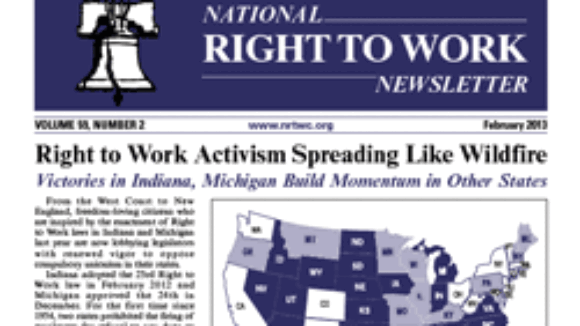
Click here to download a copy Right to Work Activism Spreading Like Wildfire — Victories in Indiana, Michigan Build Momentum in Other States Big Labor…
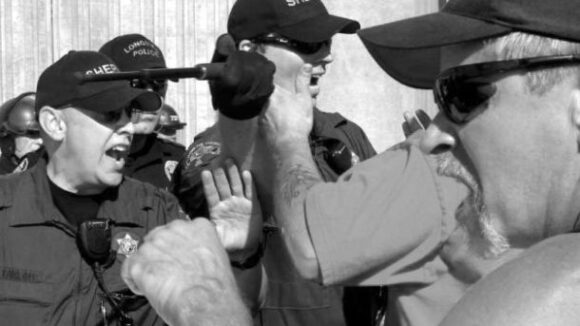
In southwestern Washington last September, overpowered police were unable to prevent bat- and ax handle-wielding union toughs from systematically sabotaging a multi-million-dollar grain terminal. Credit: AP Georgia Congressman Strives to Abolish 'Union-Thug Exemption' (Source: January 2012 National Right to Work Committee Newsletter) In today's America, prosecutions of Big Labor arson, assaults, death threats, and other serious crimes are extraordinarily difficult. Such prosecutions are frequently hindered because of a loophole in federal law that exempts extortionate violence from prosecution when it is committed pursuant to so-called "legitimate union objectives." And one objective that federal law clearly deems to be "legitimate" is to expand the number of employees who are forced to accept union representation and pay union dues as a condition of employment. "Time and again, federal prosecutors have amassed extensive evidence that Big Labor bosses have orchestrated, authorized and/or ratified violence, vandalism and threats for union organizing purposes," noted Mark Mix, president of the National Right to Work Committee. "Nevertheless, because of the pro-union violence loophole in the federal Hobbs Act, extortion prosecutions of the implicated union officials ultimately fail -- or never even get off the ground." In its controversial 1973 Enmons decision, Mr. Mix explained, a divided U.S. Supreme Court exempted threats, vandalism and violence perpetrated to secure "legitimate" union goals. Union Goons in Buffalo Accused of Sabotage, Assault With a Knife, Rape Threat What this means in practice can be illustrated by a federal criminal case, now before U.S. District Judge William Skretny in New York, against 10 former officers and militants of the Buffalo-based Local 17 of the International Union of Operating Engineers.
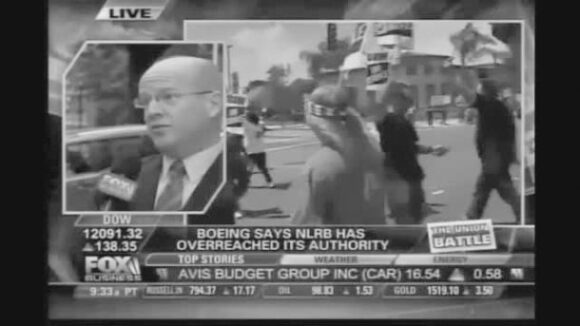
Right to Work President Mark Mix: "At a minimum, the House should consider appropriations amendments cutting off funds for pursuing the Boeing case and for implementing several other ongoing NLRB power grabs." Credit: Fox Business News But Board Abuses Will Intensify Unless Congress Does Much More (Source: October 2011 NRTWC Newsletter) On September 15, the U.S. House voted 238-186 to rebuke Acting National Labor Relations Board (NLRB) General Counsel Lafe Solomon for trying to dictate where businesses may or may not expand. By passing H.R.2587, the Protecting Jobs From Government Interference Act, last month, the House made a judgment that NLRB bureaucrats like Mr. Solomon should not have the power to order an employer to relocate jobs from one site to another. House members were responding specifically to Mr. Solomon's decision in April to file a complaint against Boeing for initiating a new aircraft production line in Right to Work South Carolina. In several public statements, Boeing executives had made no bones about the fact that their decision to expand in a Right to Work state was prompted largely by their desire to avoid or at least mitigate multi-billion-dollar revenue losses stemming from disruptive strikes. Agreeing with International Association of Machinists (IAM, AFL-CIO) union kingpins who had repeatedly ordered employees at Boeing's Washington State and Oregon facilities out on strike, Mr. Solomon claims these statements show Boeing was motivated by "anti-union animus." Consequently, the South Carolina expansion is illegal, declares Mr. Solomon. The Boeing case is currently before an NLRB administrative law judge and could potentially drag on for years. As Politics, 'the NLRB Issue Is a Doozy' For Big Labor Politicians Sponsored by pro-Right to Work freshman South Carolina Congressman Tim Scott (R), H.R.2587 aims to stop Mr. Solomon from penalizing employers legitimately concerned with strikes that disrupt production and alienate customers by telling them where they can or can't locate jobs.

Right to Work President Mark Mix: "At a minimum, the House should consider appropriations amendments cutting off funds for pursuing the Boeing case and for implementing several other ongoing NLRB power grabs." Credit: Fox Business News But Board Abuses Will Intensify Unless Congress Does Much More (Source: October 2011 NRTWC Newsletter) On September 15, the U.S. House voted 238-186 to rebuke Acting National Labor Relations Board (NLRB) General Counsel Lafe Solomon for trying to dictate where businesses may or may not expand. By passing H.R.2587, the Protecting Jobs From Government Interference Act, last month, the House made a judgment that NLRB bureaucrats like Mr. Solomon should not have the power to order an employer to relocate jobs from one site to another. House members were responding specifically to Mr. Solomon's decision in April to file a complaint against Boeing for initiating a new aircraft production line in Right to Work South Carolina. In several public statements, Boeing executives had made no bones about the fact that their decision to expand in a Right to Work state was prompted largely by their desire to avoid or at least mitigate multi-billion-dollar revenue losses stemming from disruptive strikes. Agreeing with International Association of Machinists (IAM, AFL-CIO) union kingpins who had repeatedly ordered employees at Boeing's Washington State and Oregon facilities out on strike, Mr. Solomon claims these statements show Boeing was motivated by "anti-union animus." Consequently, the South Carolina expansion is illegal, declares Mr. Solomon. The Boeing case is currently before an NLRB administrative law judge and could potentially drag on for years. As Politics, 'the NLRB Issue Is a Doozy' For Big Labor Politicians Sponsored by pro-Right to Work freshman South Carolina Congressman Tim Scott (R), H.R.2587 aims to stop Mr. Solomon from penalizing employers legitimately concerned with strikes that disrupt production and alienate customers by telling them where they can or can't locate jobs.
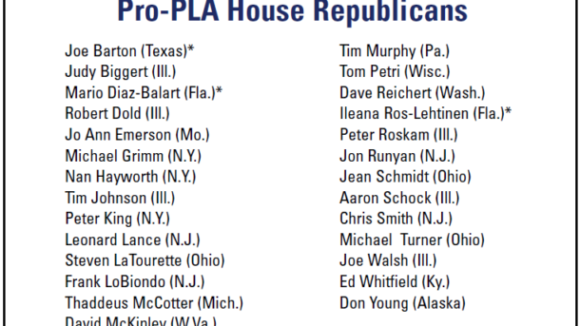
Although fewer than 12% of the 229 Republicans present and voting on the anti-Right to Work, pro-PLA LaTourette Amendment sided with Big Labor, that was enough for union lobbyists to grab a 204-203 victory. Handful of Big Labor-Appeasing Republicans Make the Difference (Source: July 2011 NRTWC Newsletter) Back in February 2009, one of the first actions President Barack Obama took after settling in at the White House was to issue Executive Order 13502, which promotes union-only "project labor agreements" (PLAs) on federally funded public works. In April 2010, the Obama Administration issued a "final rule" implementing the order. "E.O.13502 now pressures federal agencies to acquiesce to PLAs on all large public works," noted Greg Mourad, vice president of the National Right to Work Committee. "In practice, it is designed to force nonunion companies wishing to participate in public works using $25 million or more in federal funds to impose union monopoly bargaining on their employees and hire new workers through discriminatory union hiring halls. "Under union-only PLAs, independent workers who already have their own retirement funds are nevertheless forced to contribute to Big Labor-manipulated pension funds. "Rather than compromise the freedom of their employees and the efficiency of their operations, most independent construction firms simply refuse to submit bids on PLA projects." Results of 2010 Elections Raised Hopes of Pro-Right to Work Citizens

Chairman Wilma Liebman and other Big Labor members of President Obama's NLRB have proposed radical new rules for union organizing campaigns that would drastically curtail independent minded employees' ability to resist unionization. Credit: Radaris.com President's Handpicked Bureaucrats Ignore 2010 Election Results (Source: July 2011 NRTWC Newsletter) In the 2007-2008 and 2009-2010 Congresses, Big Labor's top objective was a rewrite of federal labor law making it even easier for union bosses to seize monopoly-bargaining power over millions of employees in the American private sector. Union strategists' legislative vehicle was the cynically mislabeled "Employee Free Choice Act," introduced by pro-forced unionism Congressman George Miller (D-Calif.) and Sen. Ted Kennedy (D-Mass.). After Mr. Kennedy died in 2009, union-label Iowa Democrat Tom Harkin took over as the lead Senate sponsor. The Miller-Kennedy-Harkin measure was more accurately called the "Card-Check" Forced-Unionism Bill. Even without a federal card-check mandate, union bosses have long been able to acquire "exclusive" (monopoly) power to negotiate employees' pay, benefits, and work rules solely through the acquisition of signed "union authorization cards." Consequently, individual workers under the peering eyes of union organizers may be intimidated into signing not just themselves, but all of their nonunion fellow employees, over to union-boss control. However, as stacked as current law is in favor of Big Labor's monopoly-bargaining power, employers nevertheless retain the right to stand up for their employees against union-boss intimidation tactics. But Miller-Kennedy-Harkin would have empowered union officials to impose monopoly bargaining through card checks automatically, with no recourse for any pro-Right to Work employee or employer. This legislation was totally contrary to the policy views of the vast majority of citizens, including union members. Last November 2, 31 Card-Check Bill Supporters Lost Their Re-Election Bids "Over the years, polls have shown Americans overwhelmingly oppose union monopoly bargaining, period," explained National Right to Work Committee President Mark Mix.

Chairman Wilma Liebman and other Big Labor members of President Obama's NLRB have proposed radical new rules for union organizing campaigns that would drastically curtail independent minded employees' ability to resist unionization. Credit: Radaris.com President's Handpicked Bureaucrats Ignore 2010 Election Results (Source: July 2011 NRTWC Newsletter) In the 2007-2008 and 2009-2010 Congresses, Big Labor's top objective was a rewrite of federal labor law making it even easier for union bosses to seize monopoly-bargaining power over millions of employees in the American private sector. Union strategists' legislative vehicle was the cynically mislabeled "Employee Free Choice Act," introduced by pro-forced unionism Congressman George Miller (D-Calif.) and Sen. Ted Kennedy (D-Mass.). After Mr. Kennedy died in 2009, union-label Iowa Democrat Tom Harkin took over as the lead Senate sponsor. The Miller-Kennedy-Harkin measure was more accurately called the "Card-Check" Forced-Unionism Bill. Even without a federal card-check mandate, union bosses have long been able to acquire "exclusive" (monopoly) power to negotiate employees' pay, benefits, and work rules solely through the acquisition of signed "union authorization cards." Consequently, individual workers under the peering eyes of union organizers may be intimidated into signing not just themselves, but all of their nonunion fellow employees, over to union-boss control. However, as stacked as current law is in favor of Big Labor's monopoly-bargaining power, employers nevertheless retain the right to stand up for their employees against union-boss intimidation tactics. But Miller-Kennedy-Harkin would have empowered union officials to impose monopoly bargaining through card checks automatically, with no recourse for any pro-Right to Work employee or employer. This legislation was totally contrary to the policy views of the vast majority of citizens, including union members. Last November 2, 31 Card-Check Bill Supporters Lost Their Re-Election Bids "Over the years, polls have shown Americans overwhelmingly oppose union monopoly bargaining, period," explained National Right to Work Committee President Mark Mix.
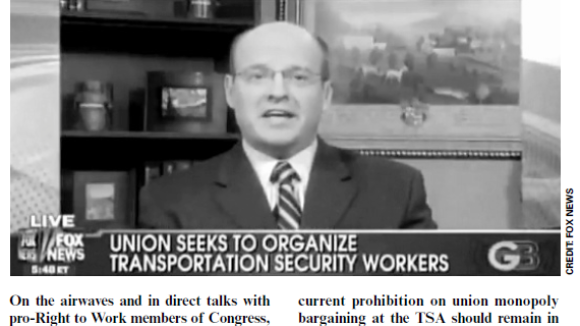
(Source: March 2011 NRTWC Newsletter) Committee Calls on U.S. House Leaders to Block Union Power Grab On February 4, President Barack Obama's handpicked head of the Transportation Security Administration publicly announced he would help government union bosses grab monopoly-bargaining control over more than 40,000 airport screeners and other TSA employees. John Pistole, who was sworn in as TSA chief in July 2010, made the move shortly after Republican John Boehner (Ohio) replaced Big Labor Democrat Nancy Pelosi (Calif.) as speaker of the U.S. House. The changing of the guard at the House made it impossible, in all probability, for union lobbyists to ram through Congress legislation mandating union monopoly bargaining at the TSA. Therefore, in order for the Obama Administration to hand federal union officials what they wanted, Mr. Pistole had to act administratively. Agency Would Likely Become 'Less Efficient and Flexible' As a consequence of the Pistole edict, the honchos of one of two large government unions, either the American Federation of Government Employees (AFGE) or the National Treasury Employees Union (NTEU), could grab so-called "exclusive" representation power at the TSA within the next few weeks. If this happens, the already much-reviled federal agency will likely become even "less efficient and flexible," as National Review Associate Editor Robert Verbruggen pointed out in a February 11 commentary.

(Source: January 2011 NRTWC Newsletter) Mark Mix: Big Government is Big Labor's bread and butter in Nevada and many other states. This winter, as state legislatures across the country prepare to go into session, many elected officials are looking for a practical way to get skyrocketing tax expenditures for compensation of state and local government employees under control. For many years now, Big Labor featherbedding and counterproductive work rules have been key factors in causing government payrolls to spiral at an alarming rate. In fact, according to inflation-adjusted U.S. Commerce Department data, taxpayers' aggregate real costs for compensation of state and local government employees soared by almost 30% between 1998 and 2008 -- an increase more than 50% greater than the total real growth of private-employee compensation. In 2009, even as the nation's economy endured a severe recession, state and local employee real compensation rose by 2.6%. Meanwhile, businesses whose revenues were plummeting had no choice but to cut back real compensation for private-sector employees by 4.3%. Right to Work States Haven't Been Immune From Government Union Virus And last fall, American voters expressed their alarm at this trend by ousting hundreds of government union boss-friendly legislators in state after state and replacing them with candidates pledging to revoke union monopoly-bargaining policies that favor government employment growth over business job growth.